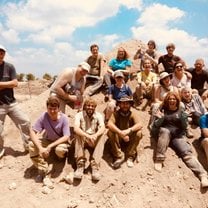Advertised as a Master's Degree in a year, the academic program was mediocre at best and entirely geared towards people with no experience in archaeology. Often you are taught one style of thinking, and if you do not agree with the teachers you will not be well accepted. Often this means disagreeing with what is traditionally thought by other scholars in the world. Grades and work ethic mean almost nothing; deadlines come and go, often with no penalty. The actual material taught is sometimes interesting, sometimes completely irrelevant. The teachers are nice, but often don’t have time to meet or listen to your ideas. Sometimes they may disappear for months without a word. Communication between the faculty and students is extremely poor. There is almost no variety in classes from year to year; only 2-3 options for electives are given, and only if you continue to the thesis track in the second year. Often you feel like an undergrad. The thesis is billed as taking another year, but it can rarely be finished in another two years. Located in the 9th most expensive city to live in in the entire world, it is extremely difficult to live comfortably unless you are already wealthy, or are able to work. There are no options for TA-ship or other paid academic positions, as it is illegal to work in Israel as a student while not being a citizen. Funding and scholarships are also almost nonexistent.
The benefits of the program revolve around it being an archaeological program that studies material that is literally found next door. The teachers are the ones that are publishing on the material you study. Often you hear the latest news before it is published. Several times during the semesters you are taken on tours to sites you have studied, or you go to museums that have the artifacts that you debate about in the classes. One of my favorite rooms in the department houses many pieces of ceramics that the teacher will occasionally pull off the shelf to demonstrate something to the class.
If archaeology is your hobby, this is a great program. If you are interested in biblical interpretation and research, this is a great program. If you are looking to advance your academic career in the field of archaeology, it is probably better to look elsewhere.










